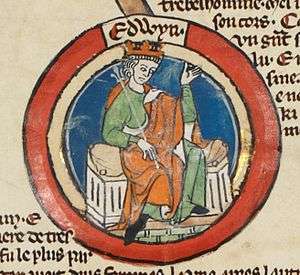Eadwig
Eadwig, also spelled Edwy or Eadwige (c. 940 – October 959), sometimes called the All-Fair,[1] was King of England from 955 until his premature death.
| Eadwig | |
|---|---|
 Eadwig in the early fourteenth-century Genealogical Roll of the Kings of England in the British Library | |
| King of the English | |
| Tenure | 23 November 955 – 1 October 959 |
| Predecessor | Eadred |
| Successor | Edgar |
| Born | c. 940 Wessex, England |
| Died | 1 October 959 (aged around 19) Gloucester, England |
| Burial | |
| Spouse | Ælfgifu (annulled) |
| House | Wessex |
| Father | Edmund, King of England |
| Mother | Ælfgifu of Shaftesbury |
The elder son of Edmund I and Ælfgifu of Shaftesbury, Eadwig became king in 955 aged 15 following the death of his uncle Eadred. Eadwig's short reign was tarnished by disputes with nobles and men of the church, including Archbishops Dunstan and Oda. He died in 959, having ruled less than four years. He was buried in the capital Winchester. His brother Edgar the Peaceful succeeded him.
Feud with Dunstan

According to the earliest life of St Dunstan, written around the year 1000, Eadwig left the banquet which followed his coronation in Kingston upon Thames, and was found cavorting with a noblewoman named Æthelgifu and her daughter. Dunstan dragged him back to the banquet, earning the enmity of Eadwig and the two women, and at Æthelgifu's instigation Dunstan was deprived of his abbacy of Glastonbury and forced into exile.[2]
The contemporary record of the Anglo-Saxon Chronicle reports Eadwig's accession and Dunstan fleeing England, but does not explain why Dunstan fled. Thus this report of a feud between Eadwig and Dunstan could either have been based on a true incident of a political quarrel for power between a young king and powerful church officials who wished to control the king and who later spread this legend to blacken his reputation, or it could be mere folklore; the Chronicle also tells of Oda putting aside the King's marriage on the grounds Eadwig and his wife were "too related".[3]
The account of the quarrel with Dunstan and Cynesige, bishop of Lichfield at the coronation feast is recorded in the Anglo-Saxon Chronicle and in the later chronicle of John of Worcester and was written by monks supportive of Dunstan's position. The "cavorting" in question consisted of Eadwig (then only 16) being away from the feast with Ælfgifu and her mother Æthelgifu. He later married Ælfgifu, who seems to have been the sister of Æthelweard the Chronicler. Æthelweard describes himself as the "grandson's grandson" of King Æthelred I. Eadwig was the son of King Edmund the Magnificent, grandson of King Edward the Elder, great-grandson of King Alfred the Great, and therefore great-great-nephew of King Æthelred I. Eadwig and Ælfgifu were therefore third cousins once removed.
Annulment of marriage
The annulment of the marriage of Eadwig and Ælfgifu is unusual in that it was against their will, clearly politically motivated by the supporters of Dunstan. The Church at the time regarded any union within seven degrees of consanguinity as incestuous.[4] At the time, "degree" was reached by counting up to the common ancestor: a second cousin would have been related within the third degree.
Division of the Kingdom
Dunstan, whilst in exile, became influenced by the Benedictines of Flanders. A pro-Dunstan, pro-Benedictine party began to form around Athelstan Half-King's domain of East Anglia and supporting Eadwig's younger brother Edgar.
Frustrated by the king's impositions and supported by Archbishop Oda of Canterbury, the Thanes of Mercia and Northumbria switched their allegiance to Eadwig's brother Edgar.[3] In 957, rather than see the country descend into civil war, the nobles agreed to divide the kingdom along the Thames, with Eadwig keeping Wessex and Kent in the south and Edgar ruling in the north.
Eadwig died on 1 October 959 and was buried in the New Minster, Winchester.[2] He was succeeded by his brother Edgar, who reunited the kingdom.
Charter evidence

Eadwig is known for his remarkable generosity in giving away land. In 956 alone, his sixty odd gifts of land make up around 5% of all genuine Anglo-Saxon charters. No known ruler in Europe matched that yearly total before the twelfth century, and his cessions are plausibly attributed to political insecurity.[5]
In art and literature
The history of Eadwig's reign caught the British imagination in the later 18th century, and was represented in paintings and drama, in particular, by numerous works to 1850. Artists who tackled the subjects it suggested included William Bromley, William Hamilton, William Dyce, Richard Dadd, and Thomas Roods. Literary works were written by Thomas Sedgwick Whalley, Thomas Warwick, Augustine David Crake and Frances Burney, who wrote a play entitled Edwy and Elgiva.[2]
References
- Britain Express – English Monarchs
- Keynes, Simon. "Eadwig". Oxford Dictionary of National Biography (online ed.). Oxford University Press. doi:10.1093/ref:odnb/8572. (Subscription or UK public library membership required.)
- Cavendish, Rishard. "Death of King Eadwig of the English", History Today, Vol. 59 Issue 10 October 2009
- Constance B. Bouchard, 'Consanguinity and Noble Marriages in the Tenth and Eleventh Centuries', Speculum, Vol. 56, No. 2 (Apr., 1981), pp. 269–70
- Chris Wickham, 'Problems in Doing Comparative History', pp. 19–20, in Challenging the Boundaries of Medieval History: The Legacy of Timothy Reuter, Patricia Skinner, ed, Brepols 2009.
External links
| Regnal titles | ||
|---|---|---|
| Preceded by Eadred |
King of the English 955–959 |
Succeeded by Edgar |